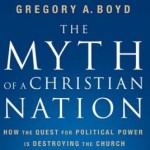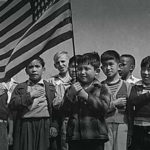We run our website the way we wished the whole internet worked: we provide high quality original content with no ads. We are funded solely by your direct support. Please consider supporting this project.

Jesus’ Kind of Social Justice
For many, the primary way of building the kingdom is to influence politics in order to make America more Christian. Others take the opposite approach, concluding that Jesus didn’t try to overhaul the political systems of his day through political means; therefore Christian faith is only a private matter that has no social relevance. Both approaches get it wrong.
Because Jesus did not allow the society or politics of his day to define his ministry, he positioned himself to make a revolutionary prophetic impact upon his society and the politics of the time. Jesus did not buy into the limited options the culture placed before him. He rather exposed the ugly injustices in all kingdom-of-the-world options by offering a radically distinct alternative.
For example, Jesus never entered into the fray of particular debates about the status of women in society. He rather exposed the ugliness of patriarchalism by the countercultural way he treated women. Ignoring negative consequences for his reputation, Jesus befriended them and gave them a culturally unprecedented dignity.
In a similar way, Jesus did the same for social outcasts. He served lepers, the blind, the demonized, the poor, prostitutes, and tax collectors. His actions were a challenge to the inhumanity of social structures of the day that served as a mustard seed alternative that started small but grew slowly.
Jesus also exposed the inhumanity of certain religious rules, which was a political problem in the first century because religious leaders had political power. He exposed the evil of racial prejudice by fellowshipping with Samaritans and Gentiles, and he even praised them in his teachings. In addition, he healed and worked miracles on the Sabbath, something that religious leaders forbade.
Finally, Jesus exposed the barbarism of the Roman government by allowing himself to be crucified by them. Instead of using his power to preserve his life, he exercised the power of love by giving it.
The power of the kingdom is not one where Christians aim to attain “power over” like the kingdoms of the world. Instead, we exercise “power under.” We therefore must resist the demonic pull toward “power over” violence that characterizes all versions of the kingdom of the world. “Power under” unmasks the ugly injustice and violence that dominates our political and social systems and doesn’t wage war “against flesh and blood” but instead fights against “rulers, against authorities, against cosmic powers of this present darkness (Eph 6:12).
It is a beautiful kingdom that is not so much spoken as it is displayed through loving action.
Jesus called the church to be a community characterized by radical, revolutionary, Calvary-quality love: a community that manifests the love of the triune God; a community that strives for justice not by conquering but by being willing to suffer; a community that God uses to transform the world by providing it with an alternative to its own self-centered, violent way of existing.
How socially and politically revolutionary it would be if we lived up to our calling!
—Adapted from The Myth of a Christian Nation, pages 119-122
Category: General
Tags: Justice, Political Idolatry, Politics, Social Issues
Topics: Ethical, Cultural and Political Issues
Related Reading

Politics & the Kingdom of the World
Instead of aligning any version of the kingdom of this world with the kingdom of God—as is common in American Christianity—kingdom-of-God participants must retain a healthy suspicion toward every version of the kingdom of this world. This is especially necessary regarding one’s own version because that’s precisely where we’re most tempted to become idolatrous (see…

“The kingdom of God…advances only by exercising power under others. It expands by manifesting the power of self-sacrificial, Calvary-like love.” [Quotes]
“While all the versions of the kingdom of the world acquire and exercise power over others, the kingdom of God, incarnated and modeled in the person of Jesus Christ, advances only by exercising power under others. It expands by manifesting the power of self-sacrificial, Calvary-like love.”

Take America (& the World) Back for God?
Kai Schreiber via Compfight Recently Missio Alliance has hosted a series of posts entitled “Christianity and Violence.” Since Greg has written quite a lot on this topic from the point of view of pacifism, we thought it timely to weigh in on this topic. The following excerpt is quoted from his chapter, “Taking America Back…

The Political Ambiguity of Caring for the Poor
Ronn aka “Blue” Aldaman via Compfight In case you think the last post was a veiled endorsement for Obama, here’s an article arguing that Mitt Romney is the candidate to vote for if you really care for the poor. Again, there are many schools of thought and it’s overly simplistic to think that voting for…

The Church & Racism in America
Elias Schewel via Compfight Over the weekend, tapes were released that revealed some shocking racists statements attributed to the owner of the Los Angeles Clippers. President Obama has commented. Sports analysts have opined. Coaches and players in the NBA are understandably disgusted and overwhelmed by it all. What should the church say at a time like this?…

Podcast: Is Pledging Allegiance to the Flag a Big Deal?
Greg discusses allegiances and pledges. http://traffic.libsyn.com/askgregboyd/Episode_0442.mp3
